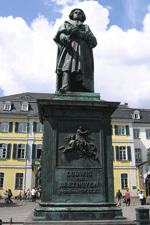> [Archived] Chronicles

The Beethoven Festival in Bonn 2012 (I)
At the same time, Bonn is the former capital of the Federal Republic of Germany - this status was lost in 1990 to the current capital, Berlin, a quiet town which has a lot to offer.
"Bonn is a charming and small place, where you can find traditional and very old objects, due to a very long history. On the other hand, a modern city, where new companies have found their headquarters, where new research is being made and where you can also find a UN headquarters which offers more and more space for clerks and opportunities to integrate more and more people here, in the local and international businesses. It offers a wonderful landscape; we have the Rhine River which will always divide the town in two parts. It's a very green and quiet city, where you can rapidly reach any place you want and where you can do what you set out to do, with the help of the partners you choose.
The town has changed quite a lot after it stopped being the capital of Germany. We have 25.000 more citizens and, in time, we are building whole other audiences for the Beethoven Festival, different from when Bonn was capital. I think that only 5% of the public that was then still is now, we built a new and younger public." - Ilona Schmiel, the coordinator of the Beethoven Festival in Bonn, the one that she has run since 2004.
Ilona Schmiel and a short history of the Beethoven Festival
"The festival started in 1845 and was created by Franz Liszt, for a very specific reason - that was when the Beethoven Monument in Munsterplaz was inaugurated, financed with the help of the citizens, but, for the most part, by Franz Liszt. To understand the importance of the event, Queen Victoria of Great Britain also participated in the inauguration, which was indeed a very peculiar endeavour. The festival wasnot designed to be an annual event; in the 1870's, a Chamber Music Festival was created right in Beethoven House that had been renovated with the help of the citizens of Bonn. Technically, after World War II, the Beethoven Festival was reanimated as an annual event, with high-class musicians and a budget accordingly, it being a festival in the capital of Germany. Each edition, they performed Beethoven's and one other's contemporary musician works.
In 1993, when the capital had already become Berlin, they decided to cancel this festival. That time's mayor didn't think of the impact of his decision: we must admit that the festival was very small then, lacking a marketing policy and ways of attracting new people. Thus, the citizens of Bonn took to the streets in a kind of marathons, alongside big names like Anne Sophie Mutter or Alfred Brendel, who performed for free, supporting the cause - Give the Beethoven Festival back to the people. So, after 1997, the festival's management was changed and started working in 1998."
Translated by Alexandru Neagoe
MTTLC, Bucharest University














